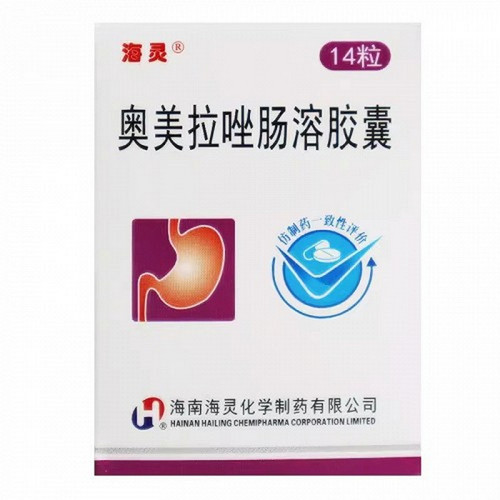Product Overview
[Drug Name]
Generic Name: Omeprazole Enteric-Coated Capsules
Trade Name: LingRui Omeprazole Enteric-Coated Capsules 20mg x 14 capsules
Pinyin Full Code: LingRui AoMeiLaZuoChangRongJiaoNang 20mg x 14Li
[Main Ingredient]
The main ingredient of this product is omeprazole.
[Properties]
This product consists of white or off-white enteric-coated pellets or granules.
[Indications/Main Functions]
Indicated for gastric ulcers, duodenal ulcers, stress ulcers, reflux esophagitis, and Zollinger-Ellison syndrome (gastrinoma).
[Specifications]
20mg x 14 capsules
[Dosage and Administration]
Oral administration; do not chew. 1. Peptic ulcer: 20mg (1 capsule) once or twice daily. Take once daily in the morning or in the evening. The treatment course for gastric ulcers is usually 4 to 8 weeks, and for duodenal ulcers is usually 2 to 4 weeks. 2. Reflux esophagitis: 20-60 mg (1-3 tablets) once or twice daily. Take in the morning or once in the morning and evening. The course of treatment is usually 4-8 weeks. 3. Zollinger-Ellison syndrome: 60 mg (3 tablets) once daily. The total daily dose can be adjusted to 20-120 mg (1-6 tablets) depending on the condition. If the total daily dose exceeds 80 mg (4 tablets), it should be taken in two divided doses.
[Adverse Reactions]
This drug is well tolerated. Possible adverse reactions include: 1. Digestive system: Dry mouth, mild nausea, vomiting, abdominal distension, constipation, diarrhea, and abdominal pain may occur; elevations in alanine aminotransferase (ALT), aspartate aminotransferase (AST), and bilirubin may occur, but these are generally mild and transient and generally do not affect treatment. International data have also reported that gastric mucosal cell hyperplasia or atrophic gastritis may be observed in gastric biopsy specimens from patients receiving long-term omeprazole therapy. 2. Neuropsychiatric System: May experience paresthesia, dizziness, headache, drowsiness, insomnia, and peripheral neuritis. 3. Metabolic/Endocrine System: Long-term use of omeprazole may lead to vitamin B12 deficiency. 4. Other: May cause rash, gynecomastia, and hemolytic anemia.
[Contraindications]
This product is contraindicated in patients with allergies, severe renal insufficiency, and infants and young children.
[Drug Interactions]
1. Avoid concomitant use with oral imidazole antifungals such as ketoconazole, itraconazole, miconazole, and fluconazole. 2. Concomitant use of omeprazole and clarithromycin may increase the incidence of central nervous system (primarily headache) and gastrointestinal adverse reactions. 3. Avoid concomitant use with diazepam (Valium), phenytoin, warfarin, nifedipine, digoxin, cisapride, quinidine, cyclosporine, caffeine, and theophylline. 4. Concomitant use with other medications may cause drug interactions. Please consult your physician or pharmacist for details.
[Precautions]
1. Do not use for more than 7 days. If symptoms persist or disappear, consult a doctor or pharmacist. 2. Do not use again within 2 months. If symptoms recur, consult a doctor immediately. 3. Do not use this product if you experience difficulty or pain swallowing; vomiting blood; or bloody or black stools. These may be signs of a serious condition; consult a doctor. 4. Patients with liver dysfunction or abnormal blood counts should use this product under the guidance of a doctor. 5. If heartburn persists or worsens, discontinue use and seek medical attention. 6. Children should only use this product under the guidance of a doctor. 7. Use with caution during pregnancy or breastfeeding. 8. In case of overdose or serious adverse reactions, consult a doctor immediately. 9. Do not use if you are allergic to this product. Use with caution if you have allergies. 10. Do not use if the properties of this product change. 11. Keep this product out of reach of children. 12. Children must be supervised by an adult before use. 13. If you are using other medications, consult a doctor or pharmacist before using this product.
[Pharmacology and Toxicology]
Proton pump inhibitor. This drug is a lipid-soluble, weakly alkaline drug that tends to concentrate in acidic environments. Therefore, after oral administration, it is specifically distributed in the secretory tubules of gastric mucosal parietal cells, where it is converted into its active form, the sulfenamide, in this highly acidic environment. It then irreversibly binds to residues of the H+, K+-ATPase (also known as the proton pump) in the gastric cell secretory membrane via a monosulfide bond, forming a sulfenamide-proton pump complex. This inhibits the enzyme's activity, blocking the final step in gastric acid secretion. Therefore, this drug has a strong and long-lasting inhibitory effect on gastric acid secretion caused by various factors.








